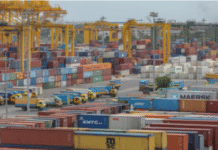
Bangladesh has joined hands with peer least-developed countries (LDCs) to appeal to the World Trade Organisation (WTO) for the continuation of trade benefits they currently enjoy following status graduation to developing nations considering the pandemic’s ill-effect on economies.
All the LDCs are scheduled to provide their forum at the WTO by 3 September their arguments in favour of the continuation for a certain period past the graduation.
Bangladesh has already sent its set of reasons to the LDC forum favouring the graduation despite the severe damage caused by the pandemic on the economy. Many have called for deferring the graduation for the pandemic losses.
However, the LDCs preferred forwarding the justifications, Sharifa Khan, additional secretary to the commerce ministry, told The Daily Star over the phone.
Chad, a north-central African country that is currently the coordinator of the LDCs at the WTO, is scheduled to submit the proposals soon, she said.
Noting Bangladesh’s economic development record, the UN Committee for Development Policy (UN CDP) is scheduled to complete in 2021 the final round of assessment for the country’s graduation.
Buy amoxil
If the UN CDP finds the assessment positive, Bangladesh will graduate to the status of a developing country in 2024.
Once the country graduates, all tariff benefits will be lifted. Only the European Union (EU) will allow the tariff benefits for Bangladesh for another three years as a grace period.
That means Bangladesh will enjoy the zero-duty benefit to the EU up to 2027 but for other countries, the tariff benefits will be withdrawn from 2024.
Currently, Bangladesh as an LDC enjoys zero-duty tariff benefits, preferential trade benefits and regional trade benefit on exports to 38 countries worldwide, 28 of which are within the EU.
The other 10 are Australia, Belarus, Canada, Liechtenstein, Japan, New Zealand, Norway, Russia, Switzerland and Turkey.
In many other countries such as Chile, Brazil and those in Latin America, Bangladesh enjoys a significant reduction in duty rates.
Also, in the US, Bangladesh enjoys zero-duty benefit on 97 per cent of its products but unfortunately, the package excludes its main export items like garment.
As a result, Bangladeshi exporters have to face a 15.6 per cent duty on export of apparel items to the American markets. Nevertheless, the US is the single largest export destination for Bangladesh.
Bangladesh will face competition in Europe after graduation as Vietnam has already signed a free trade agreement (FTA) with the EU. Some 74 per cent of Bangladesh’s export earnings come under the preferential trade as an LDC. Of it, 64 per cent comes from the EU and 10 per cent from Japan, Canada and the other developed countries.
Bangladesh’s export will decline 5.7 per cent annually if the EU’s Everything but Arms (EBA) initiative is not extended as the local exporters will then have to face an 8.7 per cent duty to the EU.
So, there is a possibility of losing more than $2 billion worth of export business annually after graduation, according to the United Nations Industrial Development Organisation.
It is important to ascertain how the loss of such treatment will impact graduating LDCs, said Roberto Azevêdo, director-general of the WTO, recently in a report on the “trade impacts of LDC graduation”.
The issue has assumed special significance with a quarter of the LDCs on the path to graduation and the associated loss of benefits tied to this status, he said.
The release of this report comes amid the COVID-19 health crisis, which is threatening the lives and livelihoods of people around the world, and having an enormous impact on economies large and small.
In early April, WTO economists projected a steep fall in trade in 2020, with the main question being the sheer depth of the decline.
The economic dislocation threatens to reverse hard-won socioeconomic development gains in the LDCs and could potentially delay graduation for some countries.
“As we monitor the impact that COVID-19 is having on all members, it will be critical to keeping a close eye on the evolving situation in graduating LDCs,” Azevedo said in the report.
It is worth noting that the analysis in this paper focused on how the graduation would affect LDCs’ trade relations, whether that graduation happens as planned or at a later date.
One of the key findings of this study is that the graduating LDCs have diverse economic profiles, with marked differences in export structure, as well as in their utilisation of — and reliance on — preferential market access.
The study explores ways to address these challenges.
It is heartening to note that the cause of graduating LDCs has received due attention from the international community, and governments at the UN and in other fora are exploring measures to assist graduating LDCs to ensure smooth transitions.
The LDC Group in the WTO is pursuing proposals in relevant WTO bodies.
There are instruments and procedures available under WTO rules that offer graduating LDCs paths to engage with members and seek recourse should they face any difficulty in their participation in the WTO, the report also said.
Primarily, all the LDCs should demand deferment of the graduation by at least three years as the global economy is severely affected by the pandemic, said Mustafizur Rahman, a distinguished fellow at the Centre for Policy Dialogue.
If the deferment is possible, it will be better. If not, all the developing and developed countries, including those within the EU, should continue the same trade benefits at least for five years past the graduation, Rahman told The Daily Star over the phone.
For instance, the aid for trade under the WTO’s Enhanced Integrated Framework and the Technology Bank support for the LDCs have been granted for five years following graduation.
So, those initiatives will definitely bring benefits for the LDCs that are going to graduate, he said.
Rahman also suggested the continuation of benefits provided to the LDCs by the WTO on pharmaceuticals up to 31 December 2032 so that Bangladesh’s emerging pharmaceuticals industry can grow and expand.
“We want the developing and developed countries to continue providing zero-duty benefit,” said Md Abdul Momen, a professor at the Institute of Business Administration of the University of Dhaka.
The pandemic has intensified the demand, said Momen, also a director of the Bangladesh Garment Manufacturers and Exporters Association, while representing the platform at a meeting on LDC graduation organised by the commerce ministry last month.
All the developed and developing countries should continue the zero-duty benefit for Bangladesh for at least 10 years so that the graduated countries could sustain their development.
For instance, only the EU will allow a three years’ grace period to up to 2027. “We demand that all the countries extend it for 10 years beyond 2027.”
This is because the EBA initiative introduced under the EU’s Generalised Scheme of Preferences (GSP) in 1968 helped Bangladesh in economic development, employment generation and women empowerment, Momen added.
Developing and developed countries except those under the EU usually do not provide a grace period, said MA Razzaque, a research director at Policy Research Institute and a noted trade economist.
But this time it is different because of the pandemic’s impact on the global economy.
Bangladesh and other LDCs should raise their voices so that all the developing and developed countries extend the tenures of the preferential trade benefits considering the economic fallout from coronavirus, he added.
Buy zithromax









